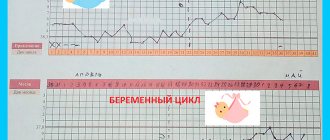A natural explanation for the disappearance of pregnancy signs
The listed signs of the presence of an embryo in the body are among the possible.
Changes in well-being are caused by a quantitative increase in progesterone. This hormone exists to ensure the conditions for the development of the fetus, that is, the formation of membranes that nourish and protect it, and retention in the uterus. But the influence of the substance is not limited to this; it controls the functions of many organs. This is normal at its early stage, in which adaptation occurs, the mother’s body becomes accustomed to the embryo. But even in the case when all the symptoms have ceased to be felt, it is not necessary to suspect the worst.
Nausea disappeared
For many, nausea is the most distressing symptom of pregnancy. But suddenly it ceases to be felt at all, and the previous irritants no longer have an effect. What does this mean? One of the variants of the norm, which has a twofold explanation:
- The body gets used to the new balance of hormones. First of all, this concerns the brain and nervous system that controls the gag reflex.
- Digestion also adapts to the increased amount of progesterone.
For some, it goes faster, and accordingly, nausea only bothers them for a couple of weeks. Others suffer from it for almost the entire pregnancy. Still other lucky women do not remember any aversion to food or smells during the entire period. So if the signs of pregnancy of this series have disappeared, there is no reason to be afraid.
The stomach has returned to normal
Painful sensations in the abdominal area are caused by two organs - the uterus and intestines. They are explained by the process of implantation of the embryo and the flow of blood into this area. As soon as the body gets used to the increased presence of biological fluid, the state of health in this area of the body returns to normal.
The intestines at the beginning of pregnancy may force you to frequently run to the toilet due to progesterone enhancing its motility. That’s why I’m worried about pain, bloating, and gases in my stomach. But over time, intestinal cells also become less susceptible to the substance. And the enlarged uterus interferes with his active motor skills.
Breasts become soft
When the symptoms of pregnancy have disappeared in the area of the mammary glands, real panic arises. In most cases it is not justified. There is still a lot of time until the first feeding, so the process of preparing the breasts for milk production may simply be slower. Some people have problems with lactation, which is not very good for the baby, but does not interfere with pregnancy. Other women have such a structure of the mammary glands that the expansion of the ducts does not compress the lobules, and therefore does not provoke discomfort in the breasts and nipples.
In addition, with a high pain threshold, a woman ceases to perceive the sensation as acutely as at the very beginning. The breast remains sensitive, but it is easier to tolerate, and therefore it seems that the symptom has disappeared.
The bladder has calmed down
Running to the toilet is common in pregnant women due to increased blood circulation. The temperature in the pelvic area rises, so the bladder is easily irritated. It needs to be emptied even though the volume of liquid is small. And when everything returns to normal, it seems to be a sign of trouble.
You shouldn't think like that. The bladder will still remind itself when the fetus becomes larger and the uterus enlarges. But early in pregnancy, fluid retention may occur in other parts of the body. And the walls of the organ get used to the increased blood supply, not reacting to it as sharply as at the very beginning.
Bloody discharge appeared
Spotting from the genital tract in pregnant women is not a sign of a threat to the condition at a very early stage, when the embryo is fixed in the wall of the uterus. But this is a one-time event, and not everyone is accompanied by bleeding.
Pregnancy can also occur against the background of hormonal deficiency. And although it is corrected with pills, some women experience menstrual-like discharge every month on days that coincide with critical periods. Sometimes this sign and excellent health do not allow pregnancy to be detected until the abdomen enlarges.
If you suddenly stop feeling sick during pregnancy
During pregnancy, sharply
1. If you suddenly stop feeling sick during pregnancy . then most likely you have ended the stage in which there is toxicosis. Toxicosis often accompanies a woman only in the first stages, in the period from 5 to 16 weeks.
2. If your blood pressure drops sharply during pregnancy . In the first trimester, this is a completely normal process developed by nature itself, and you should not worry about it. Nevertheless, consult a doctor, because low blood pressure can be a harbinger of stomach ulcers and many infectious diseases.
3. If you feel suddenly dizzy during pregnancy . The cause of dizziness can be a completely natural dilation of blood vessels in the brain, a lack of nutrients and vitamins, low iron levels in the blood, heart problems, and so on. If you feel periodic and severe dizziness, you should tell your doctor about it.
The administration of the My Pregnancy site urges expectant mothers not to use information found on the Internet, including from the site, for their own treatment or for the treatment of their child! In each case, expectant mothers should consult a doctor! Take care of the health of yourself and your unborn child!
Full or partial copying of information from the My Pregnancy website is possible only with an active hyperlink to the source of information.
Signs of a frozen pregnancy: what should cause alarm?
Unfortunately, pregnancy does not always end happily: the fetus freezes. Statistics show unpleasant figures - with the age of the mother, the risk of a frozen pregnancy increases by almost 20%. When pregnant women are under 30 years of age, these figures are two times less, but, nevertheless, every expectant mother should have maximum information
Source
I’m 6 weeks old, from the very beginning there was nagging pain and tingling in the lower abdomen, and a little later nausea appeared. I visited the doctor for 4 weeks and had an ultrasound, everything was fine. And then 2 days ago, all my symptoms stopped, as if I was not pregnant. The day before all the signs disappeared, the pain in the left side of my stomach intensified, I even lay on the bed all day. I read that it looks like a frozen pregnancy.
I’m 6 weeks old, from the very beginning there was nagging pain and tingling in the lower abdomen, and a little later nausea appeared. I visited the doctor for 4 weeks and had an ultrasound, everything was fine. And then 2 days ago, all my symptoms stopped, as if I was not pregnant. The day before all the signs disappeared, the pain in the left side of my stomach intensified, I even lay on the bed all day. I read that it looks like a frozen pregnancy.
I’m 6 weeks old, from the very beginning there was nagging pain and tingling in the lower abdomen, and a little later nausea appeared. I visited the doctor for 4 weeks and had an ultrasound, everything was fine. And then 2 days ago, all my symptoms stopped, as if I was not pregnant. The day before all the signs disappeared, the pain in the left side of my stomach intensified, I even lay on the bed all day. I read that it looks like a frozen pregnancy.
For example, I had no signs of pregnancy at all. My advice to you is just go to the doctor if you have any suspicions. But if last time you were not diagnosed with any problems (uterine tone, etc.), then everything is ok. And also, read less of all the nasty things (about frozen pregnancies, miscarriages, dead children, etc. I read at 15 weeks that if there are no movements, then it’s still a frozen pregnancy. And on top of that, I hardly gained any weight at the beginning of pregnancy. And again, after reading magazines, I sat and told myself that it was IUGR (intrauterine growth retardation). And I frayed a lot of nerves!!!
It’s just like I’m reading about myself!
Source
General recommendations and advice
During the 6th week of pregnancy, the expectant mother will need a lot of strength and energy, because now is the most serious stage of embryo formation, when vital organs are formed, bone composition, limbs, nervous system, etc. are formed.
Therefore, it is very important at this stage to monitor your health, your diet and condition
Nutrition in the 6th week of pregnancy should generally be given special attention. Usually at this time pregnant women notice a sudden, excellent appetite.
This is understandable: a growing baby requires solid supplies, not to mention the pregnant woman herself.
Therefore, now it is important to eat well and a lot, just not just anything, but the following foods:
- vegetables and fruits - fiber, vitamins, microelements;
- natural juices - vitamins and minerals; cereals: rolled oats, buckwheat, millet, muesli - fiber, vegetable protein, microelements;
- milk and dairy products, especially cottage cheese - microelements, minerals; fish and other seafood are a source of phosphorus;
- necessarily meat, only lean - animal protein;
- greens - they have a lot of fiber;
- drink as much water as possible.
Already in the 6th week, a pregnant woman may notice a change in taste preferences: she suddenly craves lard or goat’s milk. In fact, such “signals” are not accidental: apparently, the body lacks the substances contained in these products, and they are so necessary for the development of the baby.
It goes without saying that as soon as the expectant mother finds out about pregnancy, she is contraindicated to drink alcohol, smoke, or eat junk food, because all this has a negative impact on the child. It has been proven that mothers who drank alcohol during pregnancy and never let go of a cigarette give birth to children with pathologies
And here it doesn’t even matter whether they drank a little or not. You have to understand that this is a tiny child; for him, even the smallest dose will be disastrous
Junk food also has a bad effect on the baby: imagine that he gets all this with you.
As for sex, at this stage, due to a hormonal surge, the pregnant woman experiences an extremely increased libido. Therefore, if there are no complications, the woman is healthy and feels great, there is no point in limiting her sexually.
In the 6th week, it is worth adhering to a number of general notes that will help the pregnant woman get through this difficult period quite easily, and the baby himself to develop in a timely and full manner.
These are the recommendations:
- Get enough sleep: sleep and rest are the most important thing for a pregnant woman at this stage of pregnancy
- Eat well: you now have to eat for two
- Don’t tense up, be balanced and react calmly to everything that happens around you: it’s not for nothing that they say that “the baby feels everything”
- You should not play sports during this period and take on physical activity: this can cause a miscarriage
- Take careful care of yourself and your women's health
- Visit your doctor regularly, follow all his requirements and recommendations, get tested on time - all this is needed, first of all, for you and your child, and only lastly for him
- Set yourself up for a new role - the role of a mother, because in less than 8 months you will begin a completely different life, full of work, care, anxiety, but at the same time joy. Therefore, now you can read special literature about motherhood and talk with those who have already learned from personal experience what motherhood is.
So, to summarize what has been said, we note that the 6th week of pregnancy is a time of global restructuring of the expectant mother’s body and the rapid development of her baby
This is the most difficult period of the entire pregnancy: serious complications are possible at this time, so it is extremely important to monitor your health
Signs
This period still refers to the first trimester, which is considered the most difficult for a woman. The body functions under increased stress, as a global restructuring occurs, affecting many systems. Basically, the sensations associated with such a restructuring of the body are unpleasant:
- may continue to suffer from toxicosis;
- there are mood swings;
- often have to go to the toilet, since the kidneys work for two, and the enlarged uterus puts pressure on the bladder.
In the ninth week, toxicosis continues to spoil the mood of the expectant mother. Toxicosis appears:
- nausea, especially often nausea appears in the morning on an empty stomach;
- drooling;
- drowsiness, weakness;
- emotional instability.
In some women, toxicosis in the ninth week is mild, while others suffer from frequent vomiting and poor health. In the latter case, there is no need to endure and wait for toxicosis to go away on its own.
It is necessary to contact an antenatal clinic and the doctor will prescribe a treatment that, if not completely eliminate toxicosis, will at least significantly improve the well-being of the pregnant woman.
Many women are interested in how many months does toxicosis last? It is impossible to give an exact answer. Even in the same woman, during her first and subsequent pregnancies, toxicosis can manifest itself differently. But, in most cases, toxicosis goes away already from 10 or 12 weeks. So we just have to wait a little longer.
At the ninth week, the breasts still continue to grow, this happens under the influence of special hormones. In this case, the breasts may hurt a little, this is due to tissue growth and enlargement of the milk ducts.
It is impossible to say exactly how long your chest will hurt. Some women note that their breasts stopped hurting between 8 and 10 weeks. For others, discomfort persists until 4-5 months of pregnancy. It also happens that at week 10 the breasts stopped hurting, but after a while tension and other unpleasant sensations reappeared.
Advice! Many people mistakenly believe that large breasts can produce a lot of milk. In fact, the size of the mammary glands does not affect lactation.
As breasts grow rapidly, stretch marks may appear on the skin. Unfortunately, stretch marks do not disappear after the end of lactation, although they become less noticeable.
Refusal to breastfeed your baby will not affect the retention of your shape, since breasts change during pregnancy. To protect your breasts from the appearance of stretch marks, you can use special cosmetics.
The ninth week is the period when significant changes in the uterus occur; it begins to actively grow. When the gestation period comes to an end, the size of the uterus will increase 500 times compared to its original state, but for now the size of the uterus can be compared to a grapefruit. The size of the uterus in the ninth week is not yet reflected in the size of the abdomen; the gynecologist monitors changes in the uterus during examinations.
By monitoring the development of pregnancy, the doctor can refer the woman for a test that determines the level of hCG. This abbreviation refers to a hormone produced in pregnant women.
During the first weeks, the hCG level constantly increases. Then at 10 or 12 weeks there is a slight decline in growth, after which hCG levels begin to rise again until the due date arrives.
How much hCG should be in the blood of a pregnant woman at the ninth week? The range of normal values is quite wide - from 20,000 to 100,000 mU/ml. Therefore, a single analysis for hCG during this period is not very informative. In order for the doctor to judge how the fetus is developing, it is necessary to observe the hCG level over time.
That is, you will have to donate blood for hCG several times to see how the level of the hormone changes depending on the period. How many times will you have to donate blood to check your hCG level? This is decided by the doctor who monitors how the pregnancy develops.
Advice! The dynamics of hCG levels makes it possible to timely detect a frozen pregnancy, as well as chromosomal changes in the fetus. However, it is impossible to make a diagnosis based only on the level of hCG; ultrasound and other types of studies are prescribed to confirm or exclude it.
During pregnancy, every woman should undergo three routine ultrasounds. Deadline for scheduled studies:
- the first ultrasound is scheduled for a period of 10 to 12 weeks;
- the second ultrasound is performed when the pregnancy is between 18 and 22 weeks;
- The third ultrasound will need to be done closer to birth, when the period is from 33 to 35 weeks.
In addition to routine ultrasounds, additional ultrasounds may be prescribed if indications arise.
Advice! An ultrasound does not have a negative effect on the fetus, so expectant mothers should not be afraid if the doctor recommends undergoing additional examination.
Should I do an ultrasound at 9 weeks? After all, the first scheduled examination is scheduled no earlier than 10 weeks? Only a doctor can answer these questions. He may reschedule the ultrasound for a week when the pregnancy reaches 10 weeks. Or maybe he will recommend not waiting for 10 weeks, but getting tested immediately. As a rule, an ultrasound scan before 10 weeks is prescribed:
Signs of pregnancy
So, if you are planning a pregnancy, you need to pay a lot of attention to your own body and monitor all, even the most minor changes. You should definitely familiarize yourself with the presented list of the first indicators of pregnancy. These may be the following signs of the first week after conception:
- Minor bleeding.
- Frequent ailments.
- Raising the base temperature.
- Swollen female mammary glands, increasing their receptivity.
- Drowsiness, momentary asthenia and lack of composure can also signal the emergence of a new life.
- Tingling sensations from inside the uterus.
- Changes in food taste preferences, dislike of specific aromas, vomiting, nausea.
- Headache.
- Increased salivation.
- Lower back pain.
- Vaginal discharge.
- Frequent urination.
- And, ultimately, the most well-known and predicted criterion of pregnancy is a delay in the monthly cycle.
It is not at all necessary that when pregnancy occurs, a woman will immediately experience all these signs of conception. After a week of gestation, none of the above symptoms may occur; everything happens on an individual basis. There are a number of signs, if present, you should immediately go either to the pharmacy for a pregnancy test or to see a gynecologist.
How a woman’s body changes externally at 10 weeks of pregnancy
Gradually the figure acquires more rounded shapes. The tummy increases slightly, although it is not yet noticeable to others, but the uterus, having increased in size, will still slightly indicate the tummy at the very bottom. Your breasts are growing and you need to change your underwear to something more comfortable. Unpleasant pain appears. This is due to the rapid enlargement of the mammary glands, so heaviness, tingling, pain are felt, and the sensitivity of the skin on the chest increases. Hormonal changes in the body are gaining momentum, and Montgomery's tubercles become more noticeable. Perhaps the number of moles will increase or pigment spots will appear on the body. Hair will grow stronger in unwanted places. Don't worry, this will all go away after giving birth, after some time.
Discharge at 1 week of pregnancy
Your period has ended, and therefore there is no need to talk about spotting now. The first few days after menstruation may well be considered “dry”: you can forget about discharge in any form during these couple of days. However, very soon vaginal discharge makes itself felt again: before ovulation, there is usually a lot of discharge and it is distinguished by a certain “liquidity” and “transparency”. However, the closer ovulation is, the more the pattern of discharge changes: the readiness of the egg for release and conception will be indicated by a decrease in the amount of discharge, which at the same time will acquire an astringent thick consistency, reminiscent of egg white.
Well, in the meantime, the expectant mother is taking a break from bleeding in the form of the next menstruation, and from worries about the onset of ovulation, which is signaled, among other things, by the changed nature of the discharge.
It should be remembered that 1 week in the pregnancy period is more of a theoretical nature; a woman’s potential 1 week of pregnancy occurs every month, from cycle to cycle
But the practical significance of this time is just as important, especially if you are preparing to become a mother
In order to lay a strong, healthy foundation for the future baby, it is advisable to prepare properly - this will increase the egg’s chances of success, and the future embryo’s chances of full harmonious development and growth.
Therefore, now a woman should pay close attention to her health and lifestyle. You should definitely stop drinking alcohol and smoking
Living and working conditions should be as favorable as possible, this applies to both physical and psychological aspects. All medications must be discontinued. From now on, discuss any therapeutic prescription with a geneticist, and do not take anything on your own
However, genetic consultation is highly desirable for all pregnant women, and it is important to do this before 12 weeks. Avoid X-ray examinations, especially in the abdomen and pelvis
Remember to prevent viral diseases, do not visit places where there are large numbers of people. It is also necessary to undergo a medical examination to rule out possible chronic diseases, including STDs.
Start eating healthy and healthy, take a complex of vitamins for pregnant women with a mandatory content of folic acid (at least 0.4 mg). Avoid coffee and strong tea, chocolate and Coca-Cola.
A pet should be placed with relatives or friends, because this is not the best company for cohabitation with an expectant mother. Cats, which are often carriers of toxoplasmosis, are especially dangerous during pregnancy.
Learn to abstract yourself, not to be nervous, not to worry, to relax and have a good rest. Avoid stress and overwork.
At this time - in the 1st week of pregnancy, when there is no trace of pregnancy itself, the woman’s hormonal background is adjusted for possible fertilization. One of your 300 thousand eggs, perhaps in two weeks, will meet with one sperm of the future father - the fastest, strongest and best sperm out of millions. Prepare for this meeting in the best possible way.
We wish you good luck!
Especially for beremennost.net - Elena Kichak
Possible risks at 10 weeks
Many expectant mothers experience abdominal pain at 10 weeks. In this case, it is recommended to visit a doctor; perhaps due to hormonal changes, the functioning of the stomach is disrupted, but there may be a risk of losing the child. Especially if the pain is severe and accompanied by bleeding. Copious bleeding at this time can indicate not only the threat of miscarriage, but also the presence of an ectopic pregnancy. Just at the period when the embryo begins to actively develop, such a pathology makes itself felt. When obvious symptoms appear in the form of bleeding and sharp severe pain, you must immediately call an ambulance. Even a woman’s life depends on the promptness of medical care.
Fetal development at 30 weeks weight, size and gender
Now the baby has grown to 40 cm in length and weighs about 1400-1500g, his subcutaneous fat is actively developing. From this time, the lungs actively begin to synthesize a special substance, surfactant, which allows the lungs not to stick together and collapse during exhalation. But the respiratory system is still imperfect and matures with each week remaining until birth. The brain tissue is developing no less actively, in which there are more and more convolutions and grooves, and the nervous system is gradually included in the functioning of all departments. Nerve cells perform their main functions; special nerve fibers are formed, which are surrounded by a myelin sheath that protects them during operation. Gradually, the baby’s wrinkled skin smoothes out, and subcutaneous fat is deposited. The skin is still covered with vernix, which accumulates in the folds, but lanugo (vellus hairs) gradually begins to disappear, but some children may have hairs on their body until birth, then they will disappear in the first days of life.
Note!
- The fungus won't bother you anymore! Elena Malysheva tells in detail.
- Elena Malysheva - How to lose weight without doing anything!
From this time, the child’s liver begins to actively accumulate iron, forming its reserves for several months of life. If your baby is born premature, he may develop anemia due to iron deficiency. Iron is necessary for the synthesis and renewal of blood cells - red blood cells, which deliver oxygen to the fetal tissues. Now the fetus already has a clear heart rhythm - it beats approximately 130-160 beats per minute; during hypoxia, the heartbeat may slow down, and the doctor will note this fact. Girls and boys may have slight differences in heart rate, up to 10 beats.
At this stage, the fetus is very cramped in the uterus and it usually already takes its stable position for childbirth, head down, although for another two to three weeks if its position is incorrect, it can turn around. This may require special gymnastics or special positions. Due to the limited space, the child can no longer actively move, he can only push, he can grimace, squint, yawn, hiccup. If there are no movements or they are too sudden, this should alert him, perhaps he is developing hypoxia. The child has developed vision, he can distinguish between light and dark, he hears and feels touch perfectly. The child constantly hears the mother’s heart sounds and the work of his intestines, experiences swaying when moving, which calms him down. And from the sharp sounds outside he winces and freezes. Now it’s worth watching your emotions. The child already responds well to the release of adrenaline in the mother’s body. At this time, you can clearly determine the sex of the fetus; if you have not done this before, it will be clearly visible by ultrasound examination.
If pregnancy is not desired
Unfortunately, it may also happen that the pregnancy appeared at the wrong time or that the woman did not need it at all. When a pregnant woman begins to look for ways to terminate a pregnancy at 9 weeks, she should not turn to folk crafts, grandma’s methods, etc. Today, a simple, vacuum abortion at 9 weeks of pregnancy is the most gentle way to get rid of the consequences of unprotected sex. Your decision must be 100% balanced and deliberate. Medical abortion is no longer possible at such a long term. And abortion with curettage is too much stress for the body.
Should we sound the alarm? Has anyone had this happen and how did it end? It’s very scary, last time the pregnancy froze at 17 weeks, but then there were no signs to notice. We only found out through an ultrasound. This time, from 6 weeks, I felt sick from lunch until bedtime. I just felt sick, not sick. And the nipples hurt, the breasts themselves did not enlarge and did not hurt. I had an ultrasound at 5.6, everything was fine, my heart was beating. I haven't registered yet. In general, yesterday was the first day off after a week of work and I didn’t feel sick all day at all! But my nipples hurt. Today I woke up and again I don’t feel sick and my nipples don’t hurt anymore.((I’ve already thought about the worst((I’m thinking about going for an ultrasound this week, it’s scary(
How can a woman understand that she is pregnant?
The desire to have a child makes many women almost psychics. At least they claim that they felt the emergence of new life before more definite signs appeared. And yet, pregnancy changes the functioning of the body so much that clear manifestations of the new situation arise from the first weeks:
- nausea (mainly in the morning), vomiting;
- menstruation stops;
- due to increased blood circulation in the uterine area, tingling and sometimes mild pain are detected;
- the breasts swell, become more sensitive, nipples hurt, their color darkens;
- food preferences change;
- there is a need to urinate more often;
- a feeling of fullness appears in the stomach;
- Fatigue quickly sets in and drowsiness appears.
This is a general list of signs of the initial stage of pregnancy. Individual characteristics of the body can expand or narrow it, making some manifestations more noticeable. Some of the symptoms listed may not bother you at all. But if it suddenly turns out that your health has completely returned to its previous characteristics, this causes legitimate concern about whether the signs of pregnancy may disappear. After all, it is common knowledge that they are present for at least 3 months.
Analyzes and tests in the antenatal clinic
We looked at the sensations in the stomach at 9 weeks of pregnancy and what happens to the baby at this stage of life. You can now go to the antenatal clinic to register and monitor the progress of your pregnancy. Try to answer as honestly as possible all the questions the doctor asks. This period is extremely important; possible problems in the 9th obstetric week of pregnancy are related to what is happening in your life. The doctor necessarily prescribes several tests that need to be taken.
- General and biochemical blood test. Blood from a vein will be taken at least 3 times throughout the pregnancy, and blood from a finger, like urine, will be taken every month.
- Blood clotting test. A very important test called a coagulogram.
- General urine analysis. The doctor must monitor their condition; during pregnancy they experience severe overload.
- HIV and STD testing. This check is mandatory for every pregnant woman.
- Blood test for group and Rh factor.
- ECG. The heart is also under a lot of stress, so it is necessary to monitor its condition.
- Ultrasound.
Pregnancy 2 weeks, what does the embryo look like?
In the earliest period of pregnancy, the embryo does not yet resemble a person, or even an embryo from a biology textbook. 2 weeks after conception, the fetus is implanted into the wall of the uterus and begins to actively develop. The main development of the fetus during this period of time is aimed at protecting the unborn baby and feeding it.
The walls of the uterus prepare to receive a fertilized egg every month: the epithelium becomes thick and loose, and a thick protective layer is formed. At the moment when the embryo enters the uterus and attaches to its wall, it is completely immersed in the soft tissue, and the decidua is formed around it, which will later develop into the placenta and amniotic sac.
After complete implantation, when the decidua is formed, rapid fetal development begins. Already in the second or third week of pregnancy after conception, the rudiments of the skeletal system, ribs, and spine are formed in the unborn baby, and the nervous and respiratory systems are developing.
After 2 weeks of pregnancy after a missed period, doctors determine for sure that the woman is carrying a child. This is determined by one test that leaves no doubt - the fetal heartbeat, which can be heard with a special device. No other test, blood test, or even chairside examination will give such a definite result as listening to the fetal heartbeat. During the 2nd week of pregnancy after a delay, the embryo has already formed a spine with bone marrow, a heart and the first large blood vessels. The embryo itself reaches a size of 0.5-1.0 mm. Over the next week its size will increase two to two and a half times.
During the next period of pregnancy, the fetus separates from the wall of the uterus, and it is no longer a clot of cells attached to the wall of the uterus, but a miniature person who develops independently, using the resources of the mother’s body. At this time, the fertilized egg becomes visible on an ultrasound machine.
A pregnancy period of 2 weeks can carry different meanings. According to obstetric calculation methods (from the last menstruation), 2 weeks is just the beginning of ovulation, when the egg leaves the follicle and enters the fallopian tube. But, despite the fact that conception has not yet taken place during this period of time, during gynecological examinations and manipulations this time will be indicated as the second week of pregnancy. A more accurate system for calculating the date of conception based on sexual intercourse may also go astray, since the process of generating a new life is not instantaneous, but is extended over a week or more. And the third method, 2 weeks from a missed period or 6 weeks according to the obstetric calendar, when the child is already clearly visible on an ultrasound.
Pregnancy is one of the best periods in a woman’s life
During this period, expectant mothers are advised to sleep more, exercise carefully and little by little, spend more time in the fresh air and be less nervous. Proper nutrition, moderate physical activity and good rest will help you conceive and bear a healthy baby.
What happens to a woman’s body at 9 weeks
At the 9th obstetric week of pregnancy, almost 100% of expectant mothers have already learned about their interesting situation in one way or another. Some of the ladies who were least fortunate became acquainted with toxicosis in all its manifestations. Now everything is slowly but surely calming down. The body gets used to its new state and the hormonal riot returns to normal. For many lucky ones, by the 9th week of pregnancy, toxicosis disappeared and their appetite finally improved.
What needs to be done this week?
- A young mother can already register with an antenatal clinic. This must be done before 12 weeks. The doctor will fill out your card, weigh you, take measurements, take a smear, and examine your cervical pharynx.
- Take a blood and urine test. To collect urine efficiently, you need to wash yourself and close the vaginal opening with a clean cotton pad or bandage. If this is not done, secretions that have accumulated overnight may end up in the collection container.
Prolactin begins active restructuring in the body of a pregnant woman. The first drop of colostrum appears from the breasts of many women. This happened if you noticed that the nipple became slightly wet or a dried mark remained on the underwear. Don't be upset if you haven't noticed it, colostrum can appear at night. For many expectant mothers, breasts remain sensitive until mid-pregnancy. It often happens that a pregnant woman notices how her breasts stopped hurting at 9 weeks of pregnancy.
Growth hormone also activates its activity. It is needed for the development of the fetus during this period of its life. The uterus at 9 weeks of pregnancy is already the size of a small orange. Slender girls can already notice a tiny mound on their stomach, which will very quickly grow to the size of a good watermelon. But more often, young mothers notice that at 9 weeks of pregnancy there is a pulling in the lower abdomen. This means that the belly is growing.
Signs and sensations in the 6th week of pregnancy
As a rule, at the 6th week of pregnancy, many women do not feel any changes in the body, but it all depends on individual characteristics. Some people already begin to experience early toxicosis at this stage: morning sickness, dizziness and shortness of breath. And some people observe absolutely nothing, except for a sharp weight loss. This occurs due to the fact that a woman’s body accumulates all the necessary resources for the development of a new life, stocking up on large quantities of them. This can explain the weakness, lethargy and drowsiness that a pregnant woman feels at this stage: the body is concentrated on the embryo and directs all its forces to its development.
Many mothers are only learning about their “interesting situation” in the 6th week of pregnancy. This is the period when the level of progesterone in a woman’s blood reaches its maximum level, and any pregnancy test can easily determine it. In addition, the embryo is already clearly visible on ultrasound images, and any gynecologist, conducting an examination on a gynecological chair, will feel a slightly “grown” uterus, which directly indicates pregnancy. You can “track” pregnancy using a blood test for hCG, which in a woman planning to become a mother is several times higher than normal levels.
But, of course, no external signs indicating the birth of a new life in a woman’s body are yet noticeable. It should be added that during this period the expectant mother’s immunity sharply decreases, so it may be that she suddenly discovers a cold, runny nose and other infections. Gynecological viral infections, such as thrush, are also possible. This is nothing more than a signal of decreased immunity. In this case, you need to visit a gynecologist who will give recommendations, but also, of course, take care of yourself and your baby.
General recommendations
If you have already registered or just know that you are pregnant, try to be careful. Doctor's recommendations are of course necessary and cannot be done without them. But don’t forget that you are the mother, and all the most important things depend on you.
- do not wear things that compress the stomach (tight elastic bands, tightly fastened trousers);
- do not drink alcohol or other harmful drugs (drugs, tobacco);
- do not overeat (this will only worsen toxicosis);
- try to protect yourself from stress.
From this day forward, forget about the bath, only the shower is not hot, but warm. Don't forget, your baby has just begun to form, try to arrange everything as best as possible.
Nausea during pregnancy
If you feel sick during pregnancy
Nausea during pregnancy is a very common ailment. It takes expectant mothers by surprise not only in the morning, but also during the day and even at night. The intensity of the attacks varies from woman to woman: some experience only minor stomach upset for a short time, while others have a very difficult time because food and liquid do not stay in their bodies for long.
In any case, every pregnant woman wants to know what to do with nausea during pregnancy, how to minimize the manifestation of such an illness. The following tips can help with this.
1. Eat small portions, but often.
When the stomach is empty, it produces acid that irritates the stomach lining. In addition, an empty stomach can cause low blood sugar, which is why expectant mothers feel sick during pregnancy.
2. Eat foods containing proteins and complex carbohydrates.
Protein foods (eg, eggs, cheese, yogurt) and complex carbohydrates (eg, whole grain bread, cereal, baked potatoes) prevent stomach upset, help relieve nausea during pregnancy, and are simply good for mother and baby.
3. Avoid foods and drinks that make you uncomfortable.
More appetizing food is unlikely to turn you inside out. And try not to eat a lot of food at once. Leave the table a little hungry.
4. Stay hydrated.
Dehydration can worsen toxicosis. Therefore, pregnant women should drink plenty of fluids. If you have an aversion to liquids, you can eat foods that contain a lot of water, such as grapes, watermelon and other fruits and berries.
5. Try taking vitamin B6.
Vitamin B6 helps if you feel very sick during pregnancy and, if the dose is observed, will not harm the health of the mother and child. But before purchasing any dietary supplements, consult your doctor.
6. Include ginger in your diet.
Ginger (Zingiber officinale) in tea, ale or biscuits may help relieve nausea. Ginger tea is very good for relieving vomiting.
7. Try taking an herbal infusion.
An infusion of 2 parts black chamomile (Ballota nigra), one part meadowsweet (Filipendula ulmaria) and one part Roman chamomile (Chamaemelum nobile), take 3 times a day. But before taking any herbal medicine, be sure to consult your doctor. Perhaps the doctor will advise other folk methods on how to get rid of nausea during early pregnancy, which are guaranteed to be safe for expectant mothers. For example, you can consult about taking lemon balm, which also contains a large amount of vitamin C.
8. Keep your mouth feeling fresh.
Peppermint and regular tooth brushing can reduce excess saliva. Rinsing your mouth and/or brushing your teeth after vomiting will help prevent tooth decay and calm your stomach. Make it a habit to always carry mint chewing gum with you.
9. Rest well.
Fatigue and stress will only make you feel worse.
In various cases, the fight against nausea during pregnancy has varying degrees of success. Some women find one or more remedies that can completely relieve them of this ailment, while others may suffer from nausea throughout their pregnancy. In addition, women expecting twins or triplets, due to increased hormone levels, may suffer from toxicosis much longer than expectant mothers expecting one child. Sometimes until the 20th week. But still, for most pregnant women, nausea that occurs during early pregnancy stops by the end of the first trimester.
Nausea during pregnancy
When remembering pregnancy, almost every woman will first of all tell you about how she felt sick from her husband’s favorite perfume, from the delicious chicken curry and from the very thought of the upcoming birth. Therefore, many expectant mothers are terrified of the delay, and with it, nausea. But everything is not so bad. Pregnancy begins, but there is still no nausea.
It’s a paradox, but even in this case, a pregnant woman can panic. After all, everyone and everywhere is talking about early toxicosis! In the end, after consulting with your friends, you will still come to the conclusion that the option without nausea is much better! Yes, and my grandmother said that “a boy” makes me sick, and if not, a girl will be born! And you dream so much about your daughter!
Most likely, grandma’s predictions are fabulous. You can check this in 9 months, but for now you need to figure out why you feel sick and what to do about it.
Causes of nausea during pregnancy
So why do you feel sick during pregnancy? There are several possible answers to this question. But to be honest, none of them are 100% true. Another mystery of the nature of the female body. However, scientists do not sit idly by and all the time put forward a lot of different theories, which are supported by a number of studies and surveys.
For example, studies by Canadian scientists have shown that children “whose mothers made their mothers sick” have high intellectual abilities. Researchers suggest that the hormones that cause morning sickness have a beneficial and positive effect on the development of the unborn child's brain.
Professor of neurobiology at Cornell University Paul Sherman also confirms the benefits of “pregnant” nausea. He believes that it is nausea and vomiting that helps the mother’s body protect itself from harmful substances, thereby saving the fetus from damage and protecting the mother from miscarriage. T
Source
Why did I stop vomiting at 8 weeks of pregnancy?
I don't feel pregnant
10th week of pregnancy, I stopped vomiting at 8 weeks. Since then I’ve been afraid that I’m not pregnant, maybe there was a mistake or something else (((although I went for an ultrasound for 6 weeks and am registered with the LCD. Maybe this all sounds stupid, but I somehow feel uneasy: no I feel nauseous, don’t vomit, don’t have a stomach ache, don’t want to sleep all the time like I did at 5-8 weeks, and the baby shouldn’t push yet.
Who told you that in general everyone is sick? Toxicosis is individual. I was torn until 12 weeks, but many of my friends had nothing at all from the first day. Some people have tox for a couple of days, while others have it for the entire pregnancy. So don't beat yourself up.
I have been in this state throughout my entire pregnancy, now I am week 18 (according to ultrasound). I don’t feel anything, I’ve never had toxicosis, but my stomach seems to stick out a little, and there’s still silence. On Friday I have an ultrasound - only after them I calm down for a while. On the contrary, we would be happy, but this asymptomatic situation only worries us.
I also don’t feel nauseous at all, and I don’t want salty or sweet or bitter or anything like that. On the contrary, I don’t want anything. The only thing I feel is a tingling sensation in the area of the ovaries, and I don’t know if this is normal or not
girls, it’s great when there’s no toxicosis, but I keep fantasizing about what it’s like to eat something that doesn’t make me sick. Yesterday it was delicious, but today it’s disgusting
10th week of pregnancy, I stopped vomiting at 8 weeks. Since then I’ve been afraid that I’m not pregnant, maybe there was a mistake or something else (((although I went for an ultrasound for 6 weeks and am registered with the LCD. Maybe this all sounds stupid, but I somehow feel uneasy: no I feel nauseous, don’t vomit, don’t have a stomach ache, don’t want to sleep all the time like I did at 5-8 weeks, and the baby shouldn’t push yet.
I was in the same situation, only I didn’t feel sick at all. All sorts of bad thoughts overwhelmed me. barely made it through the first
Source
When to see a doctor
A condition where you constantly feel sick during pregnancy and vomit more than 5 times a day is considered pathological. It is fraught with dehydration and requires hospital treatment. If toxicosis is complicated by the following manifestations, you should immediately call a doctor:
- sudden weight loss;
- stool disorder;
- increase in temperature;
- abdominal pain;
- dizziness;
- loss of consciousness;
- increased sweating.
Such symptoms may indicate severe intoxication, both during gestosis and poisoning. The slightest delay is fraught with premature placental abruption or termination of pregnancy.










